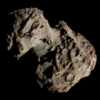38P/Stephan–Oterma
| Discovery | |
|---|---|
| Discovered by | Coggia, Jerome E. |
| Discovery date | January 22, 1867 |
| Alternative designations | P/1980 L2, P/1942 V1, P/1867 B1, 38P |
| Orbital characteristics A | |
| Epoch | 1981-Apr-26 (JD 2444720.5)[1] |
| Aphelion | 20.920 AU (near Uranus orbit) |
| Perihelion | 1.5744 AU (near Mars orbit) |
| Semi-major axis | 11.247 AU |
| Eccentricity | 0.86002 |
| Orbital period | 37.72 yr |
| Inclination | 17.981° |
| Last perihelion | November 10, 2018[2][3] December 5, 1980[1][3] |
| Next perihelion | 2056-Aug-28[2] |
38P/Stephan–Oterma (also known as Comet Stephan–Oterma) is a periodic comet with an orbital period of 38 years. It fits the classical definition of a Halley-type comet with (20 years < period < 200 years).[1] It was discovered in January 1867, by Jérôme Eugène Coggia at Marseilles Observatory, France.[1]
38P/Stephan–Oterma last came to perihelion on November 10, 2018.[2][3] It was recovered by Pan-STARRS on June 24, 2017 while 5.3 AU from the Sun.[2] The next perihelion passage is August 28, 2056.[2]
Orbit[]
It has perihelion near the orbit of Mars and has aphelion near the orbit of Uranus. Acting like a centaur-hybrid, between the years 1982 and 2067, this object will make close approaches to the giant planets Jupiter, Saturn, and Uranus.[4] If this object did not have a coma and (for some definitions) had a perihelion beyond Jupiter's (5 AU), it would be considered a centaur.

References[]
- ^ a b c d "JPL Small-Body Database Browser: 38P/Stephan-Oterma" (last observation: 1981-04-04; arc: 114.18 years). Jet Propulsion Laboratory. Retrieved 2009-05-07.
- ^ a b c d e MPC
- ^ a b c Seiichi Yoshida (2004-07-31). "38P/Stephan-Oterma". Seiichi Yoshida's Comet Catalog. Retrieved 2011-10-23.
- ^ a b "JPL Close-Approach Data: 38P/Stephan-Oterma" (last observation: 1981-04-04; arc: 114.18 years). Retrieved 2009-05-07.
External links[]
- Orbital simulation from JPL (Java) / Ephemeris
- Gary W. Kronk's Cometography page for 38P
- Cometary object articles
- Periodic comets
- Halley-type comets
- Numbered comets
- Comets in 2018
- Astronomical objects discovered in 1867
- Comet stubs

